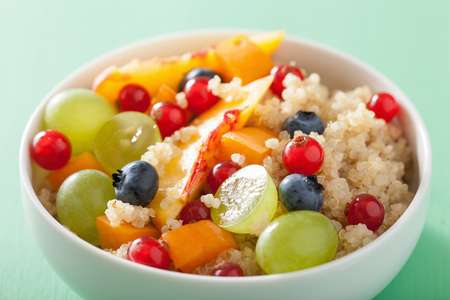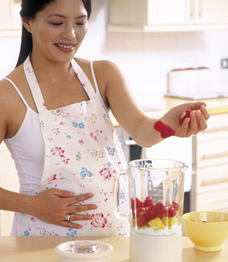Your Pregnancy Diet

In this article, you will find:
Vitamins and minerals
In pregnancy, you need to ensure a rich supply of vitamins and minerals, since these are important for your own health and for your developing baby. They support the healthy functioning of body systems and contain antioxidants, which protect the body against the effects of harmful chemicals called free radicals. Good sources of the most important vitamins and minerals are given below. As long as you eat a varied diet that includes plenty of fruits and vegetables, you should be getting all you need, with a couple of exceptions. It can be hard to get enough iron in your diet to meet the demands of pregnancy. Your iron levels will be checked during pregnancy and supplements may be recommended. You'll also need a folic acid supplement before conceiving and in early pregnancy.
Vitamin A
This is important for healthy eyes, skin, and hair; it's found in orange fruit and vegetables, such as apricots, peppers, carrots, and tomatoes.
Vitamin B
This contributes to the healthy functioning of body systems, and helps the body fight infection. Good sources include bananas, milk, whole grains, cheese, and cabbage.
Vitamin C
This aids the absorption of iron and helps fight infection. Rich sources include citrus fruits, kiwis, peppers, broccoli, and spinach.
Vitamin D
This helps the absorption of calcium. Food sources include eggs and dark leafy green vegetables, and it is also obtained from sunlight. Women with limited exposure to sunlight, who are housebound, predominantly covered when outdoors, or from Africa, South Asia, the Middle East, or the Caribbean should take a 10 mg vitamin D supplement daily.
Vitamin E
This vitamin contains antioxidants and keeps skin, hair, and muscles healthy. Good sources of vitamin E include nuts and seeds.
Folate and folic acid
Studies have shown that sufficient amounts of the B vitamin folic acid, or its natural form folate, can help reduce the risk of neural tube defects, such as spina bifida, by up to 50 percent. In these defects, the embryonic neural tube fails to close properly during the first four weeks of pregnancy, leading to incomplete development of the brain and spinal cord. Folate helps the neural tube close and pregnant women are advised to eat a folate-rich diet. Foods high in folate include green leafy vegetables, legumes; and fortified cereals. It may not be possible to get sufficient folate through diet alone, so women are also advised to take a folic acid supplement of 400 micrograms before conception and during the first trimester.
Iron
This is needed for hemoglobin production in red blood cells. Sources include meat, fish, chicken, eggs, dried apricots, spinach, and broccoli.
Calcium
This is essential for healthy bones and teeth. Sources include dairy products, eggs, fortified cereals, and leafy green vegetables.
Zinc
This helps maintain a healthy immune system. Sources include seafood and nuts.

Eating plenty of fresh fruits and vegetables will help optimize your health during pregnancy because your body will be equipped with all the essential vitamins and minerals.